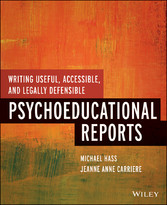Search and Find
Service
Writing Useful, Accessible, and Legally Defensible Psychoeducational Reports
'This book focuses on how to write a psychological report that is first and foremost helpful to consumers, while also being technically and legally defensible. Like the reports the authors describe, the book is carefully organized, beautifully written, and accessible to practitioners as well as graduate students. It is a brilliant accomplishment that should be required reading for every school psychologist.'
-Brent Duncan, PhD, Professor of Psychology, Humboldt State University, Arcata CA
PRACTICAL GUIDANCE ON WRITING USEFUL, ACCESSIBLE, AND LEGALLY DEFENSIBLE PSYCHOEDUCATIONAL REPORTS
From clearly identifying reasons for referral to making recommendations based on assessment results, Writing Useful, Accessible, and Legally Defensible Psychoeducational Reports offers practical guidance for creating reports that enhance the understanding of children and their strengths and challenges in order to better meet their educational and functional needs.
The authors offer step-by-step guidelines for developing an assessment plan in a collaborative process with parents, teachers, and other professionals, choosing appropriate assessment and data collection tools, gathering relevant information, and providing clear and feasible individualized recommendations that directly respond to referral concerns in a format easily understood by parents and teachers.
Ideal for graduate students in school psychology, school psychologists, and other professionals in related fields who work with children in a school setting, Writing Useful, Accessible, and Legally Defensible Psychoeducational Reports:
- Provides specific suggestions for increasing the usefulness and accessibility of reports including readability, positive phrasing, and vocabulary
- Illustrates how to develop well-formed questions and how to choose assessment tools to answer referral questions
- Reviews the legal mandates of report writing and discusses what must be included
- Demonstrates how to accurately document and integrate data from record review, interviews, observations, and tests
- Discusses how the use of the referral-based consultative assessment and report writing model can promote more active involvement in collaboration, prevention, and intervention
- Features numerous real-world cases, helpful checklists, examples of question-driven referral reports, and a model interview protocol
MICHAEL R. HASS, PhD, is a Professor of Counseling and School Psychology and Coordinator of the School Psychology program at Chapman University. He has over twenty-five years of experience as a school psychologist in public schools and as a psychotherapist and educational psychologist in private practice. He is a consultant with the Los Angeles County Department of Education Greater Avenues for Independence Program for unemployed adults with learning disabilities and Faculty-In-Residence with The Center for Autism and Neurodevelopmental Disabilities. Dr. Hass has published articles in numerous professional journals and is the current editor of Contemporary School Psychology.
JEANNE ANNE CARRIERE, PhD, has been a School Psychologist in a large urban school district for over 20 years. She is currently the Director of the Chapman Ability Project, a collaborative program designed to advance the expertise of educators, service providers, community members, and parents working and living with children with neurodevelopmental disorders. As a Clinical Associate Professor at Chapman University, she teaches, supervises, and mentors field-work students. She is on the editorial board of Trainers' Forum and Contemporary School Psychology.
All prices incl. VAT












